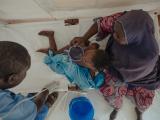Mar 28, 2006 (CIDRAP News) – Researchers have announced a new approach to making a vaccine for the foodborne illness listeriosis that may also bode well for fighting certain other infections, including salmonellosis and tuberculosis.
All three infections involve bacterial pathogens that grow inside cells, according to a Mar 20 report by Reuters news service. Essentially, antibodies in the blood don't recognize them because they are hidden within cells, according to a Harvard University news release.
Listeria monocytogenes, which can grow on refrigerated meat such as deli meats and hot dogs, can cause serious illness in pregnant women, elderly people, and others with weak immune systems. In pregnant women the pathogen can lead to influenza-like illness, premature delivery, and stillbirth.
A team led by Darren Higgins, associate professor of microbiology at Harvard Medical School, and H.G. Archie Bouwer, immunology research scientist at the Earle A. Child Research Institute and Portland (Ore.) VA Medical Center, published their findings last week in the online early edition of the Proceedings of the National Academy of Sciences.
The scientists made an attenuated strain of L monocytogenes that cannot replicate inside a host cell. The strain was readily killed in normal and immunocomproised mice, but it spurred the production of T-cells that generated an effective immune response when the mice were subsequently challenged with a virulent strain of L monocytogenes. Immunized animals were able to resist 40 times the normally lethal dose of Listeria.
"It [the vaccine strain] does not cause disease in the animal models that we tested. But it stimulates these T-cell responses, so, now, if we come back and challenge that mouse with a disease strain of Listeria, that mouse does not get sick," Higgins told Reuters.
"For the first time," he commented in the news release, "an attenuated strain of Listeria that does not replicate in an animal and does not require any manipulation of the bacterium or host prior to immunization still provides protective immunity."
"This approach of directed antigen delivery suggests a general strategy for developing safe, intracellular replication-deficient vaccine strains for stimulating protective cellular immunity to intracellular bacterial pathogens," the authors wrote in their report.
They added that this strategy "stimulates protective cell-mediated immunity to native target antigens, alleviating the need to identify specific antigenic determinants relevant for each host, and does not require additional modification to the vaccine or host."
The recent work builds on a 2002 study in which the Higgins group developed killed Escherichia coli strains that served to deliver antigens to antigen-presenting cells in the body, according to the news release. The E coli-based vaccines protected mice from tumors after they were challenged with melanoma-producing cells.
Bouwer HGA, Albert-Segui C, Berkowitz N, et al. Directed antigen delivery as a vaccine strategy for an intracellular bacterial pathogen. Proc Nat Acad Sci 2006;103(13):5102-7 [Abstract]
See also
Harvard news release
http://www.eurekalert.org/pub_releases/2006-03/hms-nva031706.php
CIDRAP overview of foodborne illness
http://www.cidrap.umn.edu/cidrap/content/fs/food-disease/causes/causes-foodborne.html
















